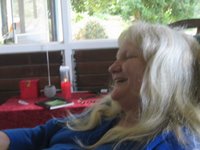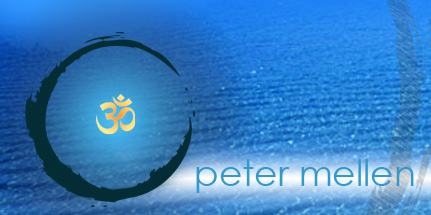Riding on the Back of an Alligator
To identify oneself with the body and yet to seek happiness is like attempting to cross a river on the back of an alligator. Ramana Maharshi
“I can’t stand those Eastern religions,” Aruni says, throwing her hands up in the air in exasperation. “They all deny the human body.”
“Yeah,” says Natavar from his position lying on the floor, his head on a pillow. “We all tried that and it didn’t work.” Natavar lived in an ashram for years and still hasn’t quite gotten over it.
“You’re not kidding,” Nita says, with a hearty belly laugh. Nita and her husband Natavar both lived in a spiritual community for over ten years. “I spent years not having sex, eating vegetarian food, and covering up my body—but it never got me any closer to God. I’ll take a nude beach and steak any time.”

“Yes,” Donna says, rocking back in her comfortable chair, her long blond hair flowing down over her shoulders, her ample body covered in a long, flowing dress. “We need to celebrate being in the body; we need to bring spirit down into the body.”
“Otherwise we’ll be zombies—disconnected from our bodies,” Aruni chimes in. Aruni is a thin, intensely neurotic woman with a tenuous grasp on reality.
Everyone nods in agreement. There are about fifteen of us sprawled around the living room, the conversation centered on how to be happy. Donna is leading the session, part of the SOUL school (School of Unconditional Love) that Donna has created. Judging from the enthusiastic response of the group, I can tell that they’re convinced that happiness comes from being in a human body.
What a recipe for disaster, I think. There’s nothing wrong with celebrating the body, but believing that we are the body will create nothing but pain and suffering. The body is not permanent—it will fail, it will die. How can I explain this to them?
The moment I think of speaking my truth in front of everyone in the room I go into a panic, terrified that no one will get what I say, or even worse, get angry; I’ll either freeze up or say something that is totally off the wall. It’s happened so many times before—I try to express my thoughts, but all I get back is blank stares. The words come out and disappear into space.
But like Peanuts running up to kick the football for the umpteenth time, I jump in anyway: “I don’t understand. How can we bring spirit down into the body when the body already is spirit? Isn’t it the other way round? Spirit or the Self isn’t ‘out there’ somewhere. It’s who we are.”
I look around at the other faces; no one seems to have understood a word. Damn it. Why is it that some people can talk and everyone hangs on their every word?
“I’m not going to deny my body,” Aruni says vehemently. “I like my body. I like my feelings.”
“Yeah,” someone adds.
Huh? She didn’t get a word I said. And now she’s pissed. Maybe if I tell her about my own experience she’ll get it.
Struggling to find the right words, I say, “I enjoy life in a body too. I love good food, good wine, good sex. But I also realize that if I open up to these pleasures, I open up to the flip side, which is pain and suffering. Pleasures are always temporary—and are inevitably followed by pain in some form or another. That’s the world of opposites.
A few heads nod.
“The only way out, from what I can see, is to turn my awareness to that which is beyond pleasure and beyond suffering, to that which never changes. Then pleasure happens and suffering happen, and I’m not attached to either one.”
“I’ve had that happen,” Natavar says. “But I keep forgetting. Why can’t I remember it all the time?” He looks at me expectantly, waiting for an answer.
I feel on the spot. My mind goes numb. “Well, uh . . . we get it, then we lose it, we get it, and we lose it . . .”
Donna jumps in, perhaps to rescue me, “Because each time you forget, it’s an invitation to come back to the Self, to come back to Spirit.”
Why didn’t I say that? Maybe he’ll get it if I tell him about pulling the tree out by the roots . . .
“According to my teacher, Ramana Maharshi, we have two choices—we can either pull all the leaves off the tree leaf by leaf, which will go on forever, or we can pull the tree out by the roots.”
“Pull the tree out by the roots? That sounds like too much work,” Natavar laughs.
“Those Eastern teachers are always so into their heads,” Aruni says.
My God, she’s attacking Ramana, one of the greatest sages to have come out of India—one of the most compassionate beings to have walked the earth!
“No, it’s just the opposite,” I insist.
“How so?”
I start to panic. Will I be able to get this right? “The leaves on the tree represent your thoughts—okay? They’re like all the worries we keep trying to rip out one by one so we’ll finally be happy. Your mind is nothing more than a collection of these thoughts, like a million leaves.”
“So the tree is my mind.”
“Right—and your mind is your ego. Your ego is the source of all your unhappiness, of all your problems. If you could get rid of the ego you’d be blissfully happy.”
Aruni sighs, “I’m not into all that getting rid of the ego crap.”
“You don’t have to get rid of the ego or the body,” Donna says. “For a long time we thought the only way to become enlightened was by going out of the body. Now we can be fully who we are while being in the body—by accepting all of what is.”
“Yes,” I say excitedly. “From the perspective of the vastness, our thoughts and emotions are not even real—they’re not personal. They’re just consciousness rising in that vastness. All it takes is a tiny shift in everyday perception to see that all our thoughts and emotions don’t even belong to us. They’re completely impersonal. The mind that is creating them is not ‘real’ either.”
“My emotions sure as hell feel real to me,” Nita says, patting her stomach. “I can feel them locked in my belly right now.”
Aruni jumps in, “Yeah, our emotions go into our very cells. If we can’t integrate them on a cellular level they’ll remain stuck there forever.”
Oh no, she thinks her emotions are locked in her cells somewhere! Emotions are just the bodies’ reaction to the mind. They’re no more real than our thoughts. Has anyone ever found emotions in our cells?I wish I could tell her that. She’s gone through so much suffering because of this belief.
“I don’t want to live in a world with no emotions and no feelings,” Nita says. “I couldn’t stand that.”
“Wait, wait,” I say. “I can tell you from experience, you’ll still have feelings once you awaken to the truth of who you are. The difference is—and it’s a big one—is that you won’t identify with them anymore. You’ll say, ‘Oh, there’s that feeling of sadness . . . how interesting.’”
“That sounds boring to me,” Nita says. “I like my feelings. Without them I wouldn’t feel alive.”
This is so hard. I can offer her the secret to happiness, but if she’s not willing to receive it, there’s nothing I can do.
“Then keep believing the feelings are real if you want to. But there may come a time when you’re ready to end the suffering.”
“And if you keep working on yourself,” Donna says, “uncovering the blocks that keep you from your own radiance, you’ll eventually get there.”
Tears start coming to Nita’s eyes.
“Can I ask you a question?” I ask.
“Yeah.”
“Do you really want to be happy?”
“Of course I do.”
The words start to come from some place beyond my fearful mind. “The only way for that to work is to find that place which is beyond pleasure and beyond pain.”
She wipes the tears from her eyes.
“At one point you have to recognize what is permanent. To place your happiness in the body is like trying to cross a river on the back of an alligator. Sooner or later it will get you. The good news is that when the body dies, you don’t die. The only thing that is permanent is the Self.”
“So what do I do?”
“You don’t ‘do’ anything. You just relax into whatever is showing up in your life, without resistance.”
“But if I don’t feel my feelings . . .”
“Are you sure they’re ‘your’ feelings? What if they were just bubbles coming up from the bottom of a pond . . . not even belonging to you?”
“I guess I’m not ready to let go.”
“You don’t have to. They’ll still be there, but you won’t be caught in them.”
“You’ll open to life as love,” Donna says with a radiant smile.
“It doesn’t mean you’re going to be a lobotomized zombie,” I say. “It’s just the opposite. When you let go of identification with the body, you find happiness that doesn’t come and go. Life is experienced in all its fullness, in all its richness. All that’s left is the Beloved.” A sense of peace sweeps over me as I say these words.
“Yeah, well but . . .”
I smile. It no longer matters whether she gets it or not.
I do.








